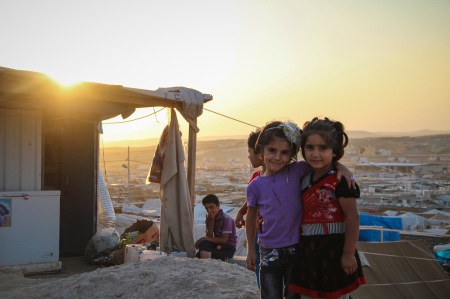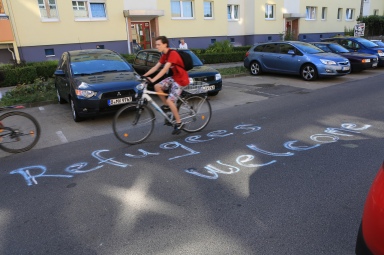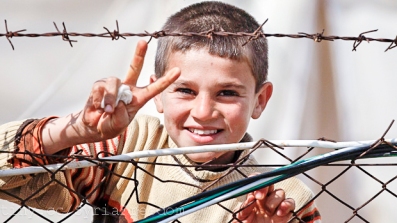Introduction
As a German, I would like to share an inside perspective into how Germany plans to handle 250,000 new students coming mostly from Syria. The refugee crisis has pushed every other news topic aside over the last two weeks and I’d like to share these news – which have not been communicated in the English speaking world to such a degree – with you.
 800,000 refugees are expected to seek asylum in Germany just this year (Source) and with a 42% (Source) of all requests being granted, Germany would expect 336,000 new inhabitants for 2015. According to the U.N. half of all refugees are under the age of 18 (Source). That would mean an additional 168,000 students that would need to go to school. Some estimates say Germany should prepare for 250,000 additional students (Source).
800,000 refugees are expected to seek asylum in Germany just this year (Source) and with a 42% (Source) of all requests being granted, Germany would expect 336,000 new inhabitants for 2015. According to the U.N. half of all refugees are under the age of 18 (Source). That would mean an additional 168,000 students that would need to go to school. Some estimates say Germany should prepare for 250,000 additional students (Source).
It’s the sheer volume of students arriving in such a short period of time that is starting to worry authorities. Apart from the current logistical challenges of registering and moving refugees across the country to their new homes, the schools will feel the pressure in the coming months when kids will start to join their German class mates. Many schools may actually benefit from the influx of refugee students because student numbers have been declining for years due to Germany’s shrinking population. 250,000 new students may save a number of schools from closure (Source). With currently 11 million children going to school an additional 250,000 would equal to an increase of just 2%. This may not seem like much, but it’s a gargantuan challenge for the educational system. Here are 4 key challenges and how Germany plans to tackle these:
.
(1) Healing Psychological Wounds and Letting Refugees Feel Safe
You can’t just empty a busload of refugees at a local school and expect them to magically adapt to their new environment. Many kids will arrive terribly scared and confused from their journey, away from home and surrounded by a completely different culture (Source). The cold winters will also pose a challenge to Syrians. The Social Pediatrics Department of the Technical University Munich estimates that 22.3% of refugee children suffer from post-traumatic stress disorder (PTSD). The Family Ministry expects 110,000 refugee children under the age of six to live in Germany by the end of this year (Source). This would imply 25,000 cases of PTSD. Michael Deckert who manages Caritas daycare centers in Würzburg recalls: “All kids are happily playing in the garden when suddenly a rescue helicopter flies over the compound towards the university hospital. The German kids look up, laugh and wave – the Syrian kids hide and run screaming into the house filled with fear” (Source). PTSD can easily take years of psychological care to treat, which would be a significant cost factor for the public health care system.
.
(2) Adapt to the Language and Culture
The German language is not your Sunday ice cream in the park. The pronunciation as well as the grammar can cause some serious headaches. Since 2005, the Federal Ministry for Migration and Refugees (BAMF) has been offering “Integration Courses” for newcomers. These courses are comprised of 600 hours of German lessons and 60 hours of lessons on the German state and society. The BAMF will be spending an additional €25 million (£18 million, $28 million) this year alone and expects the costs to be much higher in 2016 (Source). This will require a joint effort of community colleges, private language schools and church institutions to find more German teachers and increase their course offers.
.
(3) Varying Levels of School Performance
Many of the kids will not have gone to school for months if not years. A Bavarian teacher said: “Student ability ranges from true illiterates who have never gone to school, who have tended sheep or who have worked in some other way – to students who are able to attend Gymnasium [UK Sixth Form, US High School] and who can speak two, three languages, but not German” (Source). This situation requires individual support in order to ensure that each child can develop properly at the right pace. In Germany, the yearly average cost for public school education per child is about €6,500 (£4,775, $7,367), but this figure will be far higher for refugees as they need extra classes and tutoring to get to the same level of ability as their German class mates.
.
(4) Intercultural Education and Professional Networks for Teachers
Norbert Hocke from the Education and Science Workers’ Union (GEW) says: “We need intercultural competence from educators as well as trauma specialists” (Source). Cities and municipals are calling for expert-networks that serve educators with advice and consultancies. A model project at ten daycare centers in Saxony has is already offering intercultural training to primary school teachers. It is expected that kids will learn German faster and their parents parents can connect with other parents and find more time for their German courses.
.
.
Why Helping Syrians is the Right Thing to Do
 Yes, the challenges are massive. Yes, it will demand a lot of time, effort and money to get the job done. Whether Germany will financially benefit in the long run is unclear, but also completely beside the point. It is vital that young Syrians everywhere are properly educated. I really hope that they’ll one day be able to return home. And when they do, they should be equipped with all the tools they need to rebuild and develop a prosperous nation that can feel safe and help maintain peace.
Yes, the challenges are massive. Yes, it will demand a lot of time, effort and money to get the job done. Whether Germany will financially benefit in the long run is unclear, but also completely beside the point. It is vital that young Syrians everywhere are properly educated. I really hope that they’ll one day be able to return home. And when they do, they should be equipped with all the tools they need to rebuild and develop a prosperous nation that can feel safe and help maintain peace.
.
As for Germany
 There have been more than a dozen attacks on refugee accommodations (Source) across the country, but a resounding 93% of Germans say that Germany should host refugees (Source). Why Germans are so willing to help refugees is debatable. However, support for refugees is very likely take a dip in the following months and years. Good societal integration is very difficult and problems will surely arise. German political leaders will have to tread very carefully when justifying the billions of Euros spent on refugees rather than increasing government spending for the education system, which has been stagnating for years. Proper integration takes years of hard work and Germany is just at the beginning of things. Just 75 years ago, the Nazis moved millions of Jews via trains to concentration camps. Today, those same trains move refugees into German communities. A remarkable transformation.
There have been more than a dozen attacks on refugee accommodations (Source) across the country, but a resounding 93% of Germans say that Germany should host refugees (Source). Why Germans are so willing to help refugees is debatable. However, support for refugees is very likely take a dip in the following months and years. Good societal integration is very difficult and problems will surely arise. German political leaders will have to tread very carefully when justifying the billions of Euros spent on refugees rather than increasing government spending for the education system, which has been stagnating for years. Proper integration takes years of hard work and Germany is just at the beginning of things. Just 75 years ago, the Nazis moved millions of Jews via trains to concentration camps. Today, those same trains move refugees into German communities. A remarkable transformation.

